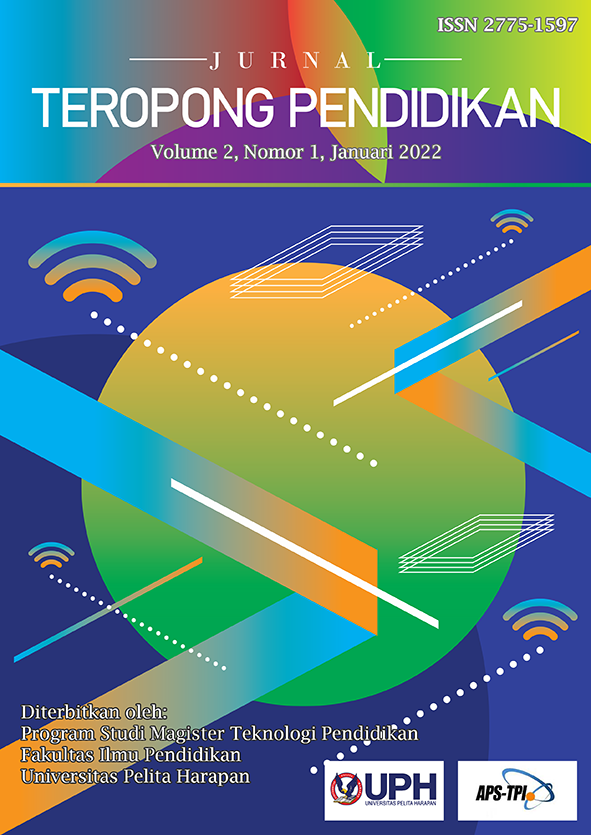Improving 3-5 Year Old Children’s Vocabulary, Listening, and Speaking Skills of English as a Second Language through Sociodramatic Play
DOI:
https://doi.org/10.19166/jtp.v2i1.5058Keywords:
Sociodramatic play, English, vocabulary, listening skills, speaking skillsAbstract
The purposes of this study were to analyze 3-5 year old children’s vocabulary, listening and speaking skills as they engaged in sociodramatic play that was set around air transportation theme. The classroom action research design for this study was done in three cycles. It utilized an opportunity that the teacher provided for fourteen research subjects to use language for multiple functions within the context of sociodramatic play by encouraging the subjects to listen to other people, and to speak up their feelings and ideas by implementing the vocabulary they have learned. The data analysis in this research showed that the implementation of sociodramatic play improved the vocabulary, the listening and the speaking skills of 3-5 year old nursery children of ABC school.
References
Bagnato, S. J. (2007). Authentic assessment for early childhood intervention: Best practices (S. N. Elliott & J. C. Witt, Eds.). The Guilford Press.
Berk, L. E. (2012). Development through lifespan: Prenatal to adolescence (5th ed.). Pearson Education.
Bozorgian, H. & Pillay, H. K. (2013). Enhancing foreign language learning through listening strategies delivered in L1: An experimental study. International Journal of Instruction, 6(1), 105-122.
Christ, T., & Wang, X. C. (2010). Bridging the vocabulary gap: What the research tells us about vocabulary instruction in early childhood. YC Young Children, 65(4).
Christie, J. F., & Roskos, K. A. (2006). Standards, science, and the role of play in early literacy education. In D. G. Singer, R. M. Golinkoff, & K. Hirsh-Pasek (Eds.), Play = learning: How play motivates and enhances children's cognitive and social emotional growth. Oxford University Press. https://doi.org/10.1093/acprof:oso/9780195304381.003.0004
Dawes, L. (2008). The essential speaking and listening. Routledge.
Fraser, S., & Wakefield, P. (1986). Fostering second language development through play in a multilingual classroom. TESL Canada Journal, 3(S1), 19-28. https://doi.org/10.18806/tesl.v3i0.991
Frost, J. L., Wortham, S. C., & Reifel, S. C. (2012). Play and child development. Pearson/Merrill Prentice Hall.
Galeano, R. (2011). Scaffolding productive language skills through sociodramatic play. American Journal of Play, 3(3), 324-355. https://eric.ed.gov/?id=EJ985538
Kemmis, S., & McTaggart, R. (2005). Participatory action research: Communicative action and the public sphere. In N. K. Denzin & Y. S. Lincoln (Eds.), The Sage handbook of qualitative research (pp. 559-603). Sage Publications Ltd.
Konishi, H., Kanero, J., Freeman, M. R., Golinkoff, R. M., & Hirsh-Pasek, K. (2014) Six principles of language development: Implications for second language learners. Developmental Neuropsychology, 39(5), 404-420. https://doi.org/10.1080/87565641.2014.931961
Moyles, J. R. (2012). A-Z of play in early childhood. McGraw-Hill Open University Press.
Pramling-Samuelsson, I. & Fleer, M. (2009). Play and learning in early childhood settings: International perspectives. Springer. https://link.springer.com/book/10.1007/978-1-4020-8498-0
Rajapaksha, P. L. N. R. (2016). Promoting oral language skills in preschool children through sociodramatic play in the classroom. International Journal of Education & Literacy Studies, 4(1), 15-23. https://doi.org/10.7575/aiac.ijels.v.4n.1p.15
Sheridan, M. D. (2011). Play in early childhood from birth to six years. Routledge.
Singer, D. G., & Singer, J. L. (2005). Imagination and play in the electronic age. Harvard University Press. https://doi.org/10.4159/9780674043695
TakaÄ, V. P. (2008). Vocabulary learning: Strategies and foreign language acquisition. Multilingual Matters Ltd.
Thwaites, J. (2008). 100 ideas for teaching personal, social and emotional development. Continuum.
Wortham, S. C. (2006). Early childhood curriculum: Developmental bases for learning and teaching. Pearson Education Inc.
Downloads
Published
Issue
Section
License
Authors who publish with this journal agree to the following terms:
1) Authors retain copyright and grant the journal right of first publication with the work simultaneously licensed under a Creative Commons Attribution License (CC-BY-SA 4.0) that allows others to share the work with an acknowledgement of the work's authorship and initial publication in this journal.
2) Authors are able to enter into separate, additional contractual arrangements for the non-exclusive distribution of the journal's published version of the work (e.g., post it to an institutional repository or publish it in a book), with an acknowledgement of its initial publication in this journal.
3) Authors are permitted and encouraged to post their work online (e.g., in institutional repositories or on their website). The final published PDF should be used and bibliographic details that credit the publication in this journal should be included.







